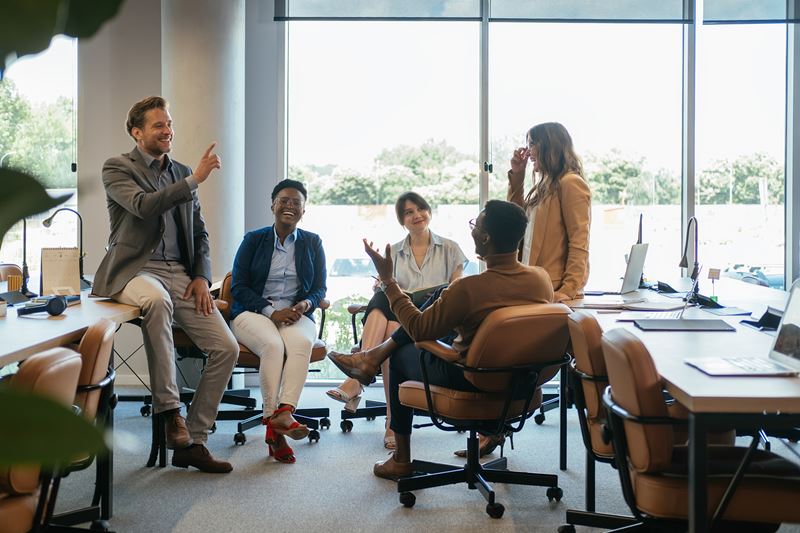Pride in the workplace
Pride in the workplace
Sovereign’s Chad Hunter, VP of IT, and Matthew Campbell, VP of Finance, Claims & Strategy, share their thoughts on inclusivity in the insurance and technology industries, their own personal experiences being members of the 2SLGBTQ+ community in the workplace, and ways we can all be more inclusive.
What are some of the challenges the 2SLGBTQ+ community face in the workplace?
Chad: Despite the increase in focused workplace programs that support diversity and inclusion, the 2SLGBTQ+ community does continue to experience human rights challenges in a variety of ways. In my career, I’ve certainly been witness to or experienced first-hand homophobic or transphobic slurs, offensive jokes, harassment and even workplace benefits that were extended only to heterosexual couples. I genuinely believe that people would prefer to do good rather than harm in this world, so I acknowledge that some of the challenges may be a lack of understanding or an unconscious bias.
Matthew: It’s not always easy to be yourself in the workplace. As a non-visible minority, people make assumptions, and often in the workplace, one has to come out over and over again. It takes a lot of mental energy. When it comes to interviewing or promotions, you always wonder if someone will not consider you if they knew you identified as part of the 2SLGBTQ+ community. Another workplace challenge is that policies are not always reflective of the diversity of situations that are needed to support the 2SLGBTQ+ community. That lens hasn’t traditionally been at the forefront when policies are reviewed.
What positive changes are you seeing in the insurance or tech industries that aim to better support the 2SLGBTQ+ community?
Chad: When I came out 25 years ago and saw my future in the IT space, admittedly I was quite worried. As a matter of fact, I left my first job in the IT department of a large car manufacturer after about four months because I was being treated quite differently than others and felt that it would stifle my career progression. However, I believe that a lot has transpired for the better in the past 25 years. Specifically, from a tech perspective, I follow many public facing tech leaders and it's been amazing to see how many are part of this community and vocalize their support. The most obvious being Tim Cook, CEO of Apple, amongst other public faces like the co-founders of PayPal, Sirius XM, Microsoft, IBM, and the list goes on and on!
Matthew: We are now seeing insurance companies making an effort with diversity when it comes to the 2SLGBTQ+ community. It’s lagged behind other sectors, even the banking sector. However, there are steps being taken in the right direction like updates to policy wordings, extending benefits to account for diverse family situations, talking about diversity/creating awareness, and profiling 2SLGBTQ+ role models in senior positions. Some companies are even creating employee groups to bring the community together.
Can you speak to how this may impact you personally?
Chad: Seeing more and more 2SLGBTQ+ executives sharing their stories and experiences and leading with confidence and conviction absolutely inspires me. Leading by example, demonstrating new or different behaviours than in the past, representing diverse thought and action — all of this really does make me think of a world where we all can be seen and treated as equal. For me, being gay has been tough and uncomfortable at times, but it has also given me the confidence to be myself.
Matthew: I’m proud to see that the insurance industry is embracing diversity and inclusion as a whole, and in particular, is making strides in relation to 2SLGBTQ+ inclusion. It allows people at all levels to be their authentic self. As a senior executive, I’ve gotten to a point in my career where I am who I am and, if people have an issue, I’ll confront them. However, depending on your position within an organization, it can be difficult to stand up for yourself, so I’m glad that at our organization there is a greater awareness and mechanisms in place such as our enterprise-wide D&I strategy and forum.
Microaggressions are defined as commonplace verbal, behavioral or environmental slights, whether intentional or unintentional, that communicate hostile, derogatory, or negative attitudes toward stigmatized or culturally marginalized groups. What are some examples of microaggressions that members of the 2SLGBTQ+ community face day to day, and particularly at work?
Chad: Microaggressions can make those on the receiving end feel uneasy, out of place or even unsafe. Can you imagine coming to work every day feeling unsafe or out of place? In my opinion, the microaggression I’ve mostly seen in the workplace is insensitive humour and making stereotypical assumptions based on someone’s appearance and/or tone of voice.
Matthew: Microaggressions in the workplace often come in the form of one-off comments or, what people would classify as jokes – often in the form of stereotypes. It is generally not picked up by others, so as a non-visible minority you are often left sitting there feeling attacked and alone with no avenue for correcting it. It often happens in a meeting or at an after-work event and the conversation moves on quickly.
How do we address this in the workplace?
Chad: Further education, asking questions, and sharing stories, just like this, are perfect examples of how we can help to support each other and, overtime, change our behaviours – both conscious or unconscious. Like many things in this world, this is not a light switch. We do not change behaviours overnight. It’s a journey. One that requires commitment, education, practice, and time.
Additionally, programs like The Co-operators and Sovereign’s D&I strategy, and investment in the importance of overall diversity in our organization, will truly allow us to become a high-performing organization.
Matthew: The enterprise-wide D&I strategy is a prime example of changing these microaggression behaviours. Awareness is a first step. It’s important for people to talk about their experiences and share examples. Even this discussion is a step in the right direction – sometimes small actions are a catalyst for a much bigger impact.
What would you want employees and partners to know when considering how to be more inclusive?
Chad: The first question about being inclusive is a reflective question: Am I committed to being inclusive? You may not have all the training, tools, or practice and that’s okay. No one is perfect and no one has all the answers, but together we can accomplish great things. Know that your words and actions matter. It doesn’t matter rank, title, tenure – our words matter, and words can be helpful or harmful. And lastly, be courageous. Nothing meaningful in life comes easy. If you are genuine about your commitment to being inclusive, it will start to show in the way you speak and behave.
Matthew: As Chad mentioned, being aware is the first step. Educate yourself. 2SLGBT2+ encompasses many different aspects of the community and understanding the nuances and why it matters is important. Get involved and show support. Listen and be aware of microaggressions and take the opportunity to educate in the moment. Stand up and have an impact.
Continue to learn alongside Sovereign as we navigate our D&I journey. Visit sovereigninsurance.ca/diversityinclusionjourney for resources.



